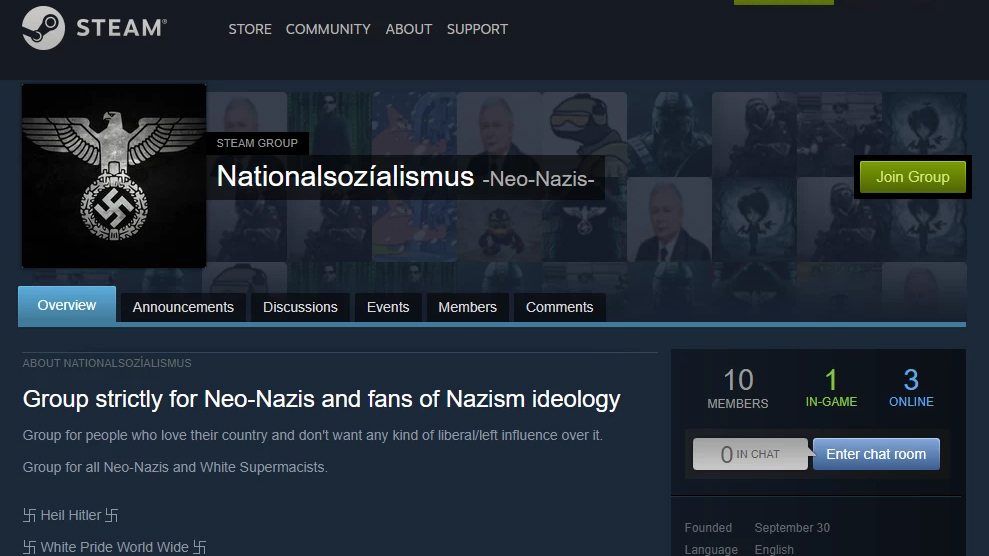Steam's new 'anything goes' policy is doomed from the start
Valve is responsible for the games published on Steam, even if it says it isn't.

Valve says it's not going to police what games are on Steam, except for those that are illegal, constitute "trolling," or don't meet technical quality standards that I wasn't aware Steam had until now. Today's blog post announcing the change demonstrates welcome transparency from Valve. It's also a mess of an explanation, 1,000 words detailing a policy that looks impossible to implement.
As the largest PC games distributor, Valve has a responsibility regarding what it chooses to sell, and what it chooses not to. We already knew Valve's stance on that responsibility. Ever since Greenlight was proposed, Valve has been saying that it does not want to decide which games get a chance at success on Steam and which don't. After Valve removed Hatred from Steam Greenlight, for instance, it returned it in short order and Gabe Newell wrote an apology to the developers. "Steam is about creating tools for content creators and customers," he said, displaying a dispassionate view of what Steam is and does.
To Valve, everything people get angry about is simply a sign for 'controversy.'
In this blog post, Valve finally reaches the destination it's been heading toward for the past decade or so. Rather than make one group mad by keeping an objectionable game off Steam, it'll make everyone mad by allowing absolutely everything on Steam.
The first of many problems with this policy is that Valve has, for the first time that I can recall, said explicitly here that it does not care who is mad. To Valve, one person or group's anger is exactly equal to any other's, and everything people get angry about is simply a sign for 'controversy.' Consider this baffling paragraph:
"The challenge is that this problem is not simply about whether or not the Steam Store should contain games with adult or violent content. Instead, it's about whether the Store contains games within an entire range of controversial topics—politics, sexuality, racism, gender, violence, identity, and so on. In addition, there are controversial topics that are particular to games—like what even constitutes a 'game', or what level of quality is appropriate before something can be released."
Here, racism is not defined as "bad," but as a "controversial topic." It is grouped with other "controversial topics," such as sexuality and identity and even the quality of a game. So it seems that in Valve's view, a customer's anger over an overtly racist game is exactly the same as a customer's anger over a game about gender identity or sexual orientation. This is a categorically absurd view. It defines hate speech and being the target of hate speech as the same thing. It defines hate speech and being mad about bad Early Access releases as the same thing. It is ridiculous.
Valve could be talking about games which 'address racism' here, but how can it not also be talking about 'racist games'? If anything goes, they are part of anything (and are already not strangers to Steam).
Keep up to date with the most important stories and the best deals, as picked by the PC Gamer team.
Valve wants us to know, however, that the games allowed on Steam "will not be a reflection of Valve’s values." Steam, then, is a conduit for developers to reach players, a utility, a free-flowing, non-stop content pipe that can contain anything (so long as it isn't illegal).
This idea is also easily exposed as bogus. Frame it like this: 'Steam is not a racist platform, but it will host racist games, promote them, and take a cut from their sales.' How can Valve say that promoting and profiting from a game doesn't reflect its values? It's a value judgment to allow this to happen in the first place.

Who decides what anime games are?
There are other problems with Valve's proposal. For starters, the company says that "trolling" will not be permitted on Steam even after this policy change takes place. You can bet that developers are going to test that claim in creative ways. And what constitutes trolling? Making low-quality games? Making parody games? Discerning between parody and malice requires some interpretation of a developer's intent, which, being impossible, only allows Valve to make more value judgments while pretending not to.
The proposed filtering tools also sound like they might be flawed in the same way that Steam's existing tagging system is. Valve suggests that an individual user could decide to filter out 'anime games.' But who decides what is or isn't an 'anime game'? Certainly not Valve, as it doesn't want to decide anything. So is it the developer? If I were a developer whose game contained characters in a style that could be described as 'anime' (say, Ni No Kuni II) I would not want my game to be invisible to part of Steam's audience. Say I filter out Steam games categorized as 'memes,' a perfectly reasonable thing to do. Going by popular tags, I would not see Vampyr. PUBG is tagged as a stealth game and a simulation. GTA5 is a racing game, apparently. Offering filters will be a messy solution, at best.
What makes Valve think that the people who use its platform to spam white supremacist mottos don't also want to publish games?
I really doubt that any of this will work at all. For comparison, while the relatively open distributor itch.io appears to have a similar 'anything goes' policy, it actually does not. Its FAQ says that "there are no restrictions for the kind of content you can host on itch.io" except legality, but its creator, Leaf Corcoran, called Steam's policy proposal "ridiculous" on Twitter. "Please keep your malicious, derogatory, discriminatory, bullying, harassing, demeaning content off @itchio," he said. "Our ban buttons are ready."
With that attitude, itch.io has developed a fairly pleasant culture, as far as I can tell from browsing it. The barebones moderation of the Steam community has not had a similar effect—in fact, Valve has had a problem with white supremacist groups in its community. Now it says it wants to apply the same approach to the games that are published on Steam. What makes Valve think that the people who use its platform to spam white supremacist mottos don't also want to publish games? Or does it really not care if they do?

Making people mad
Valve wants Steam to be viewed as a public utility while still privately owning and profiting from it.
Valve is correct that, if it sets content policies and enforces them, it's always going to make someone mad. I'd be mad if it rejected a game I think deserves to be on Steam, and mad again if it permitted something else that I think deserves to be shot into the sun. I have said before that I want Valve to state its policies explicitly, and it has done that, and yet I still criticize it. You really can't win.
But the solution is not to have no standards whatsoever, to pretend that nothing is 'bad' or 'good,' but that it's all simply 'controversial content.' No! Some things are bad! Even if I don't trust Valve to decide what is or isn't bad (and even less after this decision), I really don't trust anyone who refuses to make any distinction in the first place, and takes no responsibility for the things it promotes.
As Rock, Paper, Shotgun editor Graham Smith commented on Twitter: "Steam isn't just a store, it's a community of hundreds of millions of people, many of them young and impressionable. Analogies to smaller digital stores, bookshops, etc. don't work because those don't have teenagers hanging out on or in them all day."
This policy proposal suggests that Valve really, really doesn't want to run this community, even though it's the only one who can, because it owns it. Valve wants Steam to be viewed as a public utility while still privately owning and profiting from it. That is simply not possible.
To put down a doormat for the worst grifters, spammers, asset-flippers, sexists, and racists is irresponsible, and if Valve follows through with this half-baked plan instead of doing even the bare minimum of ideological and financial legwork to set basic standards, it will end up implicitly endorsing the worst in our culture (as it is already starting to). And to make sure the dreck is invisible to those who don't want to see it, Valve risks hiding things they do want to see. It's a bad proposal that I don't think will actually come to fruition as described (Valve will apply the term "trolling" liberally to remove games that cross the line), and we deserve better from the leader in PC games distribution than offloading all responsibility to customers.

Tyler grew up in Silicon Valley during the '80s and '90s, playing games like Zork and Arkanoid on early PCs. He was later captivated by Myst, SimCity, Civilization, Command & Conquer, all the shooters they call "boomer shooters" now, and PS1 classic Bushido Blade (that's right: he had Bleem!). Tyler joined PC Gamer in 2011, and today he's focused on the site's news coverage. His hobbies include amateur boxing and adding to his 1,200-plus hours in Rocket League.

